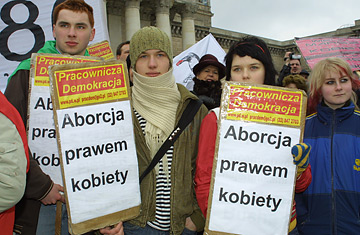
Demonstrators hold signs saying "Abortion is women's right" at a protest in Warsaw, Poland, March 28, 2007. Nearly 1,000 people demonstrated in downtown Warsaw on Wednesday, protesting plans to include an amendment in the constitution that could put an absolute ban on abortion.
On March 20, the Strasbourg-based European Court of Human Rights criticized Poland for having no effective legal framework for pregnant women to assert their right to abortion on medical grounds. It awarded 36-year old Alicja Tysiac 25,000 euros, or about $33,250, in damages after doctors refused to grant her permission to terminate her pregnancy despite serious risk to her eyesight. Tysiac, who suffers from severe myopia, became pregnant for the third time in 2000. Three doctors told her she could go blind if she gave birth but, contravening Polish law, refused to write her a certificate that would authorize an abortion. After giving birth, Tysiac's eyesight has worsened to the extent that she cannot see objects more than five feet away. She now receives a monthly disability pension equivalent to 140 euros ($187).
Responding to the decision, some 3,000 Polish men and women waving national white-and-red flags and chanting prayers gathered on Wednesday around the 19th century St. Aleksander Church, a few hundred yards from the Polish Sejm, or parliament, in downtown Warsaw to demand that the government toughen its abortion laws. "A nation that kills its children won't survive!" read one banner, quoting the late Polish pontiff John Paul II. "Poland cannot kill its babies!" declared another. "Let the unborn see our Homeland." Not far away, in Constitution Square, a Stalinist cluster of 1950s social realism architecture, about 1,000 demonstrators mounted a counter-rally in favor of loosening Poland's laws: "Free women, free world," they shouted.
Ever since the fall of communism in 1989 abortion has been a divisive issue in the predominantly Roman Catholic country. Available freely under communism, abortion was often the only means of birth control. In the early 1990s, a right-wing government introduced one of the toughest abortion laws in Europe, allowing abortion only when the pregnancy poses a threat to a woman's life or health, results from rape or when the fetus is irreparably damaged. "It's paradoxical that under communism women had a choice and now under democracy, they don't," said Barbara Kowalik, a 38-year-old academic. "Now we have a tyranny of only one worldview."
Conservative groups such as the ultra-nationalist League of Polish Families, a partner in the governing coalition, have sharply criticized the ruling and called on the government to appeal the E.U. judgment. Education Minister Roman Giertych, the League's leader, angrily denounced the European court, saying it had virtually declared that "a human right is a right to kill." His wife added that a woman who has an abortion should be punished with a life imprisonment. Nevertheless, the health minister Zbigniew Religa said that most likely Poland will not appeal the ruling.
The League, supported by the powerful ultra-Catholic Radio Maryja, is campaigning for a constitutional amendment to ban abortion in all cases, including rape and incest. The ruling Law and Justice party has agreed to change the constitution to include a phrase that says that life is protected "since conception" to strengthen the anti-abortion laws but wants to keep the current exceptions that make the procedure legal. The opposition is split: with the left against the constitional change and the center-right uncertain of what position to support. A vote is planned for mid-April.
Women's rights groups assert that, as it is, Polish women are unable to exercise their right for an abortion even when they qualify for it under the existing strict law. Speaking at a pro-choice rally Wednesday, Tysiac said the existing abortion rules legitimize injustice and harm the poor. "When one has money, she can easily get an abortion illegally. But what about people like me? Nobody cares," said Tysiac. Unsanctioned abortions may number 80,000 to 200,000 annually, according to estimates by women's rights groups. Only about a hundred abortions — within the letter of the law — are being carried out every year in Poland since the introduction of the legislation. "Women seeking help in public hospitals are being treated like beggars," said Kazimiera Szczuka, a feminist activist. "The case of Alicja is not the only one."
But Janina Sobota, a 60-year-old pensioner present at an anti-abortion rally, called the Tysiac case "a shame for Polish mothers." "A mother should protect her children, not to kill them," Sobota says. "There was no respect for life under communism," said Sobota, a mother of three. "Each time I was pregnant, the first words I heard from a doctor were: 'Pregnancy. Are we terminating?' We can't continue like that."
